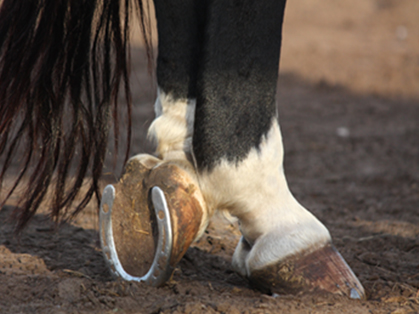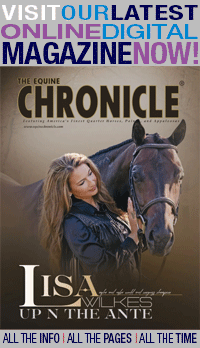Sugar and Hoof Health

By: Eleanor M. Kellon, VMD
Sugar phobia has reached a point where virtually any problem with a horse’s hooves may be blamed on sugar. From thrush to weak laminar connections, sugar is blamed. This often comes with stories of how horses have improved once the diet was changed. However, sugar is rarely the culprit here. Many different problems cause quality issues in hooves but most have nothing to do with sugar.
“Sugar” in the diet comes from things both high in simple sugars, like molasses, and foods high in starch. Because the horse’s body digests starch to the sugar glucose in the intestinal tract, that is what gets absorbed into the blood. Sugar is as essential to the life of plants as it is to animals so everything has it but in varying amounts.
The sugar-hoof connection is via insulin. Sugar causes insulin release to varying extents depending on the individual. Sustained exaggerated insulin responses (hyperinsulinemia) lead to overt laminitis or a smoldering condition where laminar connections are weak and stretched. This scenario is a genuine connection between sugar/starch and hoof health but it only applies to the 10 – 12% of the equine population that actually has those exaggerated insulin responses.
If the horse has normal insulin testing, it’s not sugar causing the problems.
Other possible factors include:
- Moisture: Change from pasture to a dry lot or track typically means a drier environment.
- Protein/amino acids: Feed changes may have benefited the protein intake or amino acid profile. For example, if you changed from grain to a balancer that has methionine this could be helpful. Just eliminating grain and replacing with hay increases protein intake. A pound of a 12% protein grain has 54 grams of protein and as many as 2.55 Kcal. A pound of 10% protein hay has 45 grams of protein but you have to feed three times as much to match the calories so protein intake jumps up to 135 grams!
- Minerals: This is probably where most of the differences originate. Whether you take the horse off pasture or bagged feeds you are reducing the iron intake significantly and in many cases, manganese as well. These two mineral excesses can worsen the already existing copper and zinc deficiencies in many areas. Feeding change recommendations also often include adding a high zinc and copper supplement.
- Better hoof care: On finding issues, your hoof care professional may shorten the interval between trims which can make a huge difference.
- Less movement: Movement is good for hoof health, as long as there is a good trim and the feet don’t hurt. Horses with any hoof problem, like negative palmar angle and irritated deep digital flexor tendon, can and often do become more lame when turned out because they are moving around a lot more.
- If you suspect a horse has hoof problems related to insulin responses, have him tested. Only lab work can really answer that question. If it’s not insulin-related, consider the points above to attempt to determine what’s going on with the horse.
To learn more, join the ECIR Group, August 13-15, for the 2021 NO Laminitis! Conference, via Zoom, which continues the mission to serve the scientific community, practicing clinicians, and owners by focusing on investigations most likely to quickly, immediately, and significantly benefit the welfare of the horse. www.nolaminitis.org
About ECIR Group Inc.
Started in 1999, the ECIR Group is the largest field-trial database for PPID and EMS in the world and provides the latest research, diagnosis, and treatment information, in addition to dietary recommendations for horses with these conditions. Even universities do not and cannot compile and follow long term as many in-depth case histories of PPID/EMS horses as the ECIR Group.
In 2013 the Equine Cushing’s and Insulin Resistance Group Inc., an Arizona nonprofit corporation, was approved as a 501(c)3 public charity. Tax deductible contributions and grants support ongoing research, education, and awareness of Equine Cushing’s Disease/PPID and EMS.
THE MISSION of the ECIR Group Inc. is to improve the welfare of equines with metabolic disorders via a unique interface between basic research and real-life clinical experience. Prevention of laminitis is the ultimate goal. The ECIR Group serves the scientific community, practicing clinicians, and owners by focusing on investigations most likely to quickly, immediately, and significantly benefit the welfare of the horse.










